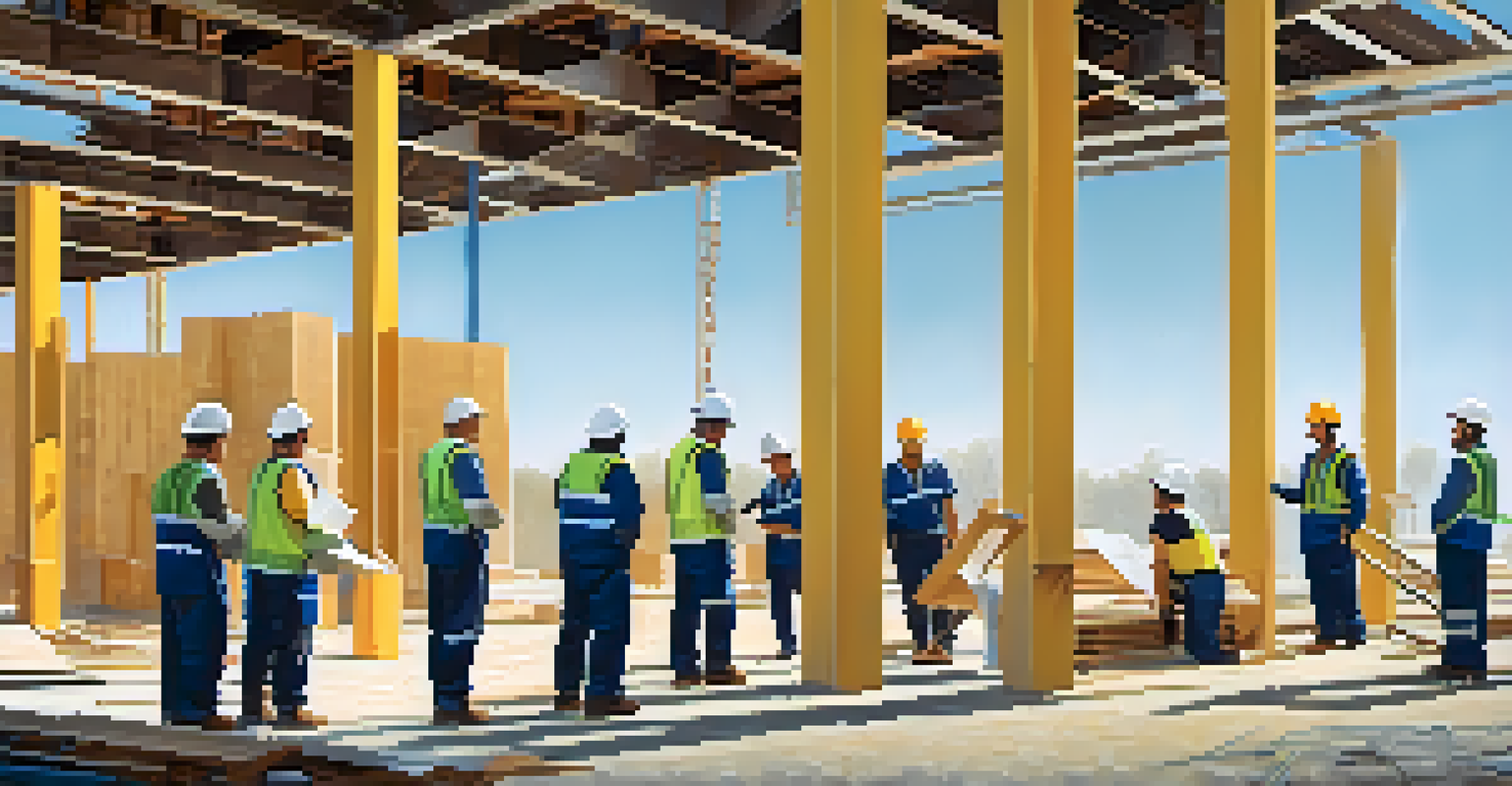Achieving Compliance with Local Building Codes

Understanding Local Building Codes and Their Importance
Local building codes are regulations that govern construction standards in specific areas. They ensure safety, accessibility, and sustainability in building practices. Understanding these codes is crucial for homeowners and contractors alike, as non-compliance can lead to fines or even project shutdowns.
Building codes are the minimum safety standards for buildings. They protect the public from unsafe construction practices.
These codes vary significantly from one location to another, reflecting the unique needs and challenges of each community. For example, coastal areas may have stricter regulations regarding hurricane preparedness, while urban settings may focus on fire safety. Being aware of these specific requirements can save time and resources during construction.
Compliance with local building codes not only protects the integrity of a structure but also promotes a sense of trust within the community. When builders adhere to these regulations, it fosters a safer environment and enhances property value, making it a win-win for everyone involved.
Researching Your Local Building Codes Effectively
The first step in achieving compliance is to research your local building codes thoroughly. This can often be done through your city or county's official website, where you can find detailed guidelines and resources. It's essential to also check for any amendments or updates, as these can change frequently.

In addition to online research, don't hesitate to reach out to local building departments or planning offices. These professionals can provide insights and answer specific questions you may have about the requirements for your project. Building relationships with local officials can also be beneficial in navigating the compliance process smoothly.
Know Your Local Building Codes
Understanding local building codes is essential for homeowners and contractors to ensure safety and compliance during construction.
Another effective research method is to consult with professionals who have experience in your area, such as architects or contractors. They can offer valuable advice based on their knowledge of local codes and past projects, helping you avoid common pitfalls and ensuring your plans align with regulatory standards.
Getting the Right Permits for Your Project
Obtaining the correct permits is a critical step in complying with local building codes. Before starting any construction, you typically need to secure a building permit, which demonstrates that your plans meet regulatory standards. This process often involves submitting detailed plans for review, so be prepared with all necessary documentation.
An ounce of prevention is worth a pound of cure.
In some cases, additional permits may be required for specific aspects of your project, such as electrical, plumbing, or zoning permits. It's important to check with your local building department to ensure you have all the permits needed before breaking ground. Failing to do so can lead to costly delays or legal issues.
Once you've submitted your permit applications, the waiting game begins. Local officials will review your plans to ensure compliance with building codes. If any issues are identified, they will provide feedback, allowing you to make necessary adjustments before approval.
Hiring Experienced Professionals for Compliance
When it comes to navigating local building codes, hiring experienced professionals can make a significant difference. Architects, engineers, and contractors who are familiar with the local regulations can help ensure that your project complies from the outset. Their expertise can save you time and reduce the risk of costly mistakes.
Additionally, these professionals can assist in preparing the required documentation and submitting permit applications. Their knowledge of the process can streamline communication with local officials, making it easier to address any concerns that may arise during the review.
Importance of Obtaining Permits
Securing the correct permits before starting construction is vital to avoid delays and legal issues related to non-compliance.
Choosing professionals with a proven track record in your area not only facilitates compliance but also enhances the overall quality of your project. Their experience can lead to innovative solutions that meet both your vision and regulatory standards.
Conducting Inspections and Addressing Issues
Inspections are a key component of ensuring compliance with local building codes. Throughout the construction process, local officials will conduct inspections at various stages to verify that work meets the established standards. It's essential to schedule these inspections in advance and be prepared for any potential issues that may arise.
If an inspector identifies problems, you'll receive a report outlining the necessary corrections. Addressing these issues promptly is crucial, as failing to do so can result in project delays or additional fines. Maintaining an open line of communication with your contractors can help facilitate quick resolutions.
Regularly reviewing the progress of your project with your team can also help ensure compliance. By staying proactive and addressing any concerns as they come up, you can keep your project on track and avoid any last-minute surprises during inspections.
Documenting Compliance Throughout the Process
Documentation is an essential aspect of achieving compliance with local building codes. Keeping thorough records of all permits, inspections, and correspondence with local officials can serve as valuable evidence that you followed the necessary steps. This documentation can be crucial if any disputes arise in the future regarding compliance.
Additionally, maintaining a detailed log of construction activities can help identify any deviations from the approved plans. If changes are made during the project, it's important to document these alterations and obtain any necessary approvals from local officials to ensure ongoing compliance.
Documentation is Key for Compliance
Maintaining thorough documentation throughout the construction process provides evidence of compliance and can protect against future disputes.
Finally, compiling all compliance documentation into a single file can simplify future reference, especially if you plan to sell your property. Potential buyers will appreciate the transparency and assurance that your project adhered to local building codes.
Staying Updated on Changes to Local Building Codes
Local building codes are not static; they evolve over time to adapt to new safety standards and community needs. Staying informed about changes in regulations is vital for anyone involved in construction or renovation projects. Regularly checking your local building department's website or subscribing to newsletters can help keep you updated.
Engaging with local trade organizations or attending community meetings can also provide insights into upcoming changes in building codes. These platforms offer opportunities to connect with other professionals and share knowledge about compliance best practices, which can ultimately enhance your projects.

By proactively monitoring changes to local building codes, you can ensure that your future projects remain compliant. This vigilance not only protects your investment but also contributes to the overall safety and well-being of your community.